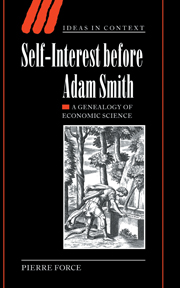Book contents
5 - Interested and disinterested commerce
Published online by Cambridge University Press: 22 September 2009
Summary
Here then is the mutual commerce of good offices in a manner lost among mankind, and every one reduced to his own skill and industry for his well-being and subsistence.
Hume, A Treatise of Human nature (1739)THE ETHICS/ECONOMICS DICHOTOMY
In his volume entitled On Ethics and Economics, Amartya Sen criticizes the “anti-ethicalism” that characterizes modern economic theory. Sen does not mean that economists have a bias against moral judgments per se (even though he suggests that some of them actually do). The claim is that, to its detriment, economic theory has historically asserted itself by excluding any form of moral consideration from its reasoning. This turn of events is rather paradoxical, if one recalls that economics was originally a branch of ethics. Aristotle discussed money and exchange in Book V of the Nicomachean Ethics. Adam Smith's position at the University of Glasgow was professor of moral philosophy. According to Sen, the methodological distinction between ethics and economics was expressed most sharply by F.Y. Edgeworth in his Mathematical Psychics. In this work, Edgeworth distinguishes between the “Economical Calculus,” which “investigates the equilibrium of a system of hedonic forces each tending to maximum individual utility,” and the “Utilitarian Calculus,” which studies “the equilibrium of a system in which each and all tend to maximum universal utility.” In economical calculus, the motives of the agent are characterized as “Egoistic Hedonism” (a reference to Sidgwick's Methods of Ethics. In utilitarian calculus, the motives of the agents pertain to “Universalistic Hedonism.”
- Type
- Chapter
- Information
- Self-Interest before Adam SmithA Genealogy of Economic Science, pp. 169 - 204Publisher: Cambridge University PressPrint publication year: 2003



